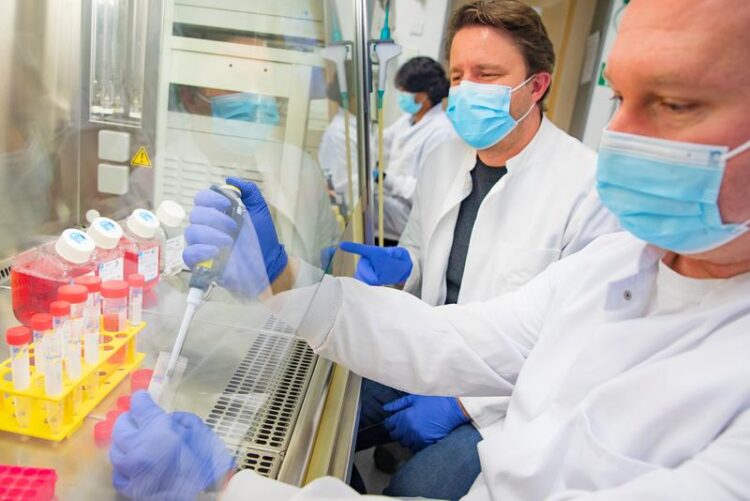More impact against cancer

Wanting to make the killer cells of the innate immune system even more fit against cancer: Professor Dr. Dr. Axel Schambach (left)
Photo: Karin Kaiser / MHH
MHH molecular physician Professor Dr. Dr. Schambach wants to use genetically modified natural killer cells to find new therapeutic options against three particularly malignant cancers. The EU is funding the project with 3.8 million euros.
Natural killer cells (NK cells) are part of the first line of defense of our immune system. They eliminate virus-infested cells and tumor cells. This makes NK cells interesting helpers in cancer therapy. Professor Dr. Dr. Axel Schambach, head of the Institute of Experimental Haematology at the Hannover Medical School (MHH), wants to genetically modify the immune cells in such a way that they detect and destroy the tumor cells even more reliably. In cooperation with researchers from the University of Copenhagen in Denmark, Lund University in Sweden and a Swedish stem cell therapy company, he plans to target the modified NK cells to three life-threatening cancers that have a particularly poor prognosis and for which there are few treatment options: pancreatic cancer, glioblastoma of the brain and the blood cancer acute myeloid leukemia (AML). The European Union is funding the project “HyperTargIPS-NK” in the category “EIC Pathfinder” over three years with around 3. 8 million euros. Of this, one million euros will go to MHH.
More impact due to molecular defensive switches
The researchers want to obtain the NK cells from so-called induced pluripotent stem cells (iPS cells). These can be produced in the laboratory from “reprogrammed” adult body cells and can then produce any cell type in the human body – including NK cells of the innate immune system. The advantage: the NK cells can be produced and transplanted quickly and in unlimited numbers. But that is not enough. “The NK cells need to be genetically modified and put into a hyperactive and more targeted state, so that they can ensure greater targeting accuracy and more extensive destruction of the tumor cells,” explains Professor Schambach.
In order to activate the NK cells, they receive an additional genetic code for the chimeric antigen receptor (CAR). This artificial signaling molecule recognises the surface of tumor cells, directs them precisely as a kind of molecular GPS system and attaches itself there with the NK cell in the tow rope. Like a defensive switch, CAR then stimulates the NK cell to destroy the cancer cell. “The hyperactivation strengthens the natural tumor defense of the NK cells and gives them more impact,” says the molecular physician.
In order to find the best CAR candidate, the researchers are testing various immune switches that, in addition to hyperactivation, are also supposed to prolong the survival of the NK cells. After transplantation, the CAR-NK cells should be accepted by the immune system of the cancer patients as much as possible and not destroyed by defensive reactions. At the same time, the transplanted NK cells must not target the recipient’s immune system. “That is why we are looking for immune switches that dock to structures that are mainly located on the tumor cell, but not on the patient’s immune cells,” says Professor Schambach.
Soften immunosuppression in tumor environment
However, the CAR-NK cells have a further task. They transmit interleukins into the immediate tumour environment. The body’s own messengers from the immune system cause an inflammatory reaction in which anti-tumour proteins such as interferon are released. In doing so, they call up other cells of the immune system to fight the cancer cells. “Actively reshaping the microenvironment softens the immunosuppressive effect in the area of the solid tumor, which further improves the destruction of the tumor cells,” explains Professor Schambach.
If suitable candidates for the immune switches are found, the hyperactivated NK cells are tested for their efficacy and safety. This is done in cell culture, in surgically removed tumour tissue from cancer patients and in mouse models. “In this project, we want to prove that CAR-NK-based cancer treatment can be a new therapeutic approach to successfully treat the three particularly malignant cancers,” says Professor Schambach. To date, the average survival time for some tumour types is only six to 18 months. The project partners have already ensured that the systems for iPS culture, NK activation and targeted modification of NK cell DNA meet the requirements of clinical application. “In this way, we want to guarantee that our Hyper-Targ iPS-NK cells are ready for rapid translational implementation after the successful completion of the study and arrive as a new therapy offering to cancer patients as soon as possible,” says Professor Schambach.
Wissenschaftliche Ansprechpartner:
For further information, please contact Professor Dr. Dr. Axel Schambach, schambach.axel@mh-hannover.de, phone (0511) 532-5170.
https://www.mhh.de/en/presse/mhh-insight/news-detailed-view/more-impact-against-cancer
Media Contact
All latest news from the category: Health and Medicine
This subject area encompasses research and studies in the field of human medicine.
Among the wide-ranging list of topics covered here are anesthesiology, anatomy, surgery, human genetics, hygiene and environmental medicine, internal medicine, neurology, pharmacology, physiology, urology and dental medicine.
Newest articles

Innovative 3D printed scaffolds offer new hope for bone healing
Researchers at the Institute for Bioengineering of Catalonia have developed novel 3D printed PLA-CaP scaffolds that promote blood vessel formation, ensuring better healing and regeneration of bone tissue. Bone is…

The surprising role of gut infection in Alzheimer’s disease
ASU- and Banner Alzheimer’s Institute-led study implicates link between a common virus and the disease, which travels from the gut to the brain and may be a target for antiviral…

Molecular gardening: New enzymes discovered for protein modification pruning
How deubiquitinases USP53 and USP54 cleave long polyubiquitin chains and how the former is linked to liver disease in children. Deubiquitinases (DUBs) are enzymes used by cells to trim protein…



